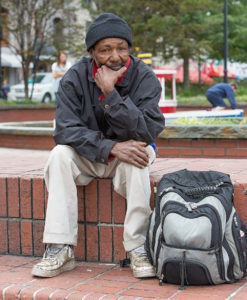DCFPI, as part of The Way Home campaign, urges the Mayor and Council to use the upcoming budget to help end chronic homelessness as soon as possible. Any delay in funding has devastating effects for residents who have been homeless for a long time and typically suffer from chronic health conditions.
 Mayor Bowser recently said that she wants “to ensure that all of DC’s residents benefit from our city’s prosperity…” Helping residents facing chronic homelessness—who are victims of DC’s prosperity and rising housing costs—should be a top priority. The Mayor should be willing to delay some or all of the $100 million in scheduled tax cuts if that is needed to make meaningful progress on homelessness.
Mayor Bowser recently said that she wants “to ensure that all of DC’s residents benefit from our city’s prosperity…” Helping residents facing chronic homelessness—who are victims of DC’s prosperity and rising housing costs—should be a top priority. The Mayor should be willing to delay some or all of the $100 million in scheduled tax cuts if that is needed to make meaningful progress on homelessness.
Being homeless often leads to a life that is cut short. People who don’t know where they’re going to spend the night struggle to receive medical treatment or counseling. And often they must stay in places that make their illnesses worse or do not keep them safe from violence.
In contrast, helping people who are chronically homeless improves their stability and health – and leads to tremendous savings. A Seattle study found that permanent supportive housing saved the city almost $30,000 per person, per year.
The Way Home Campaign is asking for the following to help individuals move out of shelters and off the streets and into their own homes:
- $5 million for Permanent Supportive Housing (PSH) for 535 individuals. PSH, which provides affordable housing coupled with intensive case management services, helps people stay in housing and improves their health, and saves a substantial amount of money as a result. This will meet 100 percent of the PSH need.
- $5.2 million to provide Targeted Affordable Housing (TAH) for 425 residents. TAH serves individuals who no longer need PSH services but still need affordable housing. This would open up expensive PSH slots for other homeless individuals. TAH also serves individuals in Rapid Re-Housing who still need help affording housing when the short-term RRH aid ends. This will meet 50 percent of the TAH need.
- $3.7 million in Rapid Re-Housing (RRH) for 343 residents. Some chronically homeless residents could be successful in Rapid Re-Housing, which provides four to twelve months of rental assistance and case management. This meets 33 percent of the RRH need.
The District has adequate resources to end chronic homelessness. The Mayor and Council can choose to #UntieDC from current policies that put tax cuts before meeting human needs. Mayor Bowser is rightly concerned that federal budget cuts will hinder DC’s ability to help vulnerable residents, but letting $100 million in DC tax cuts move forward does the same thing. Pausing tax cuts would allow DC to move vulnerable unhoused neighbors into housing, improving their lives and reducing the District’s spending on crisis response services like police and emergency room visits.
